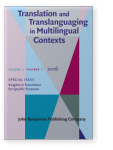Cognition and metaphor as bases for the Principle of translatability and the Principle of synonymy
The problem of equivalence in translation is sometimes falsely related to the translation of lexical meanings. In this paper we take the problem to the field of mapping cognitive functions among mental categories and their representations as concepts. This requires engaging all lexical and grammatical resources of the linguistic system and not solely considering vocabulary as the source of knowledge and information found in texts, be they oral or written. Thus, the problem of equivalence is solved by accepting the basic principles of translatability and synonymy, defined in terms of those mental contents that are behind the interpretation of complex linguistic expressions.
